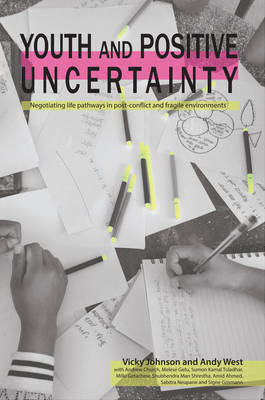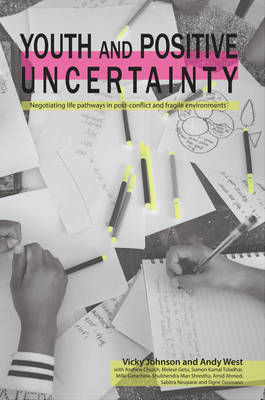
- Retrait gratuit dans votre magasin Club
- 7.000.000 titres dans notre catalogue
- Payer en toute sécurité
- Toujours un magasin près de chez vous
- Retrait gratuit dans votre magasin Club
- 7.000.000 titres dans notre catalogue
- Payer en toute sécurité
- Toujours un magasin près de chez vous
Youth and Positive Uncertainty
Negotiating Life Pathways in Post-Conflict and Fragile Environments
Vicky Johnson, Andrew WestDescription
Young people do not necessarily view uncertainty in their lives as negative, especially those most-marginalised youth who see their 'certainty' as poverty, unemployment and environmental fragility. Youth perspectives presented in this book show how some of the most-marginalised youth seek 'positive uncertainty' by escape from traditional practices and social bonds in families and communities, through migration or seeking innovative and alternative ways to meet peer, adult and societal expectations.
The authors explore how youth see uncertainty in their lives as they grow up in different parts of the world, and how they respond and take action in terms of `positive uncertainty'. When young people don't know what is going to happen in their lives and contexts, they often embrace it as positive and use their creativity to take up new opportunities and futures. Many of the poorest or most-marginalised young women and men often need to move away from home and migrate, but still want to meet the expectations of others, stay connected and be accepted back into their families and communities on their return.
The chapters describe learning from the creativity of young men and women in Ethiopia and Nepal, and youth who are genderfluid in Nepal, regarding uncertainty and discusses the implications for policy and practice, and changing societies. This type of youth-centred research can help to tell the stories of the most-marginalised and support young people's strategies in the face of both uncertainty and insecurity in conflict situations, fragile environments and communities in the global South.
Spécifications
Parties prenantes
- Auteur(s) :
- Editeur:
Contenu
- Nombre de pages :
- 272
- Langue:
- Anglais
Caractéristiques
- EAN:
- 9781788530996
- Date de parution :
- 15-08-22
- Format:
- Livre broché
- Format numérique:
- Trade paperback (VS)
- Dimensions :
- 156 mm x 234 mm
- Poids :
- 403 g







